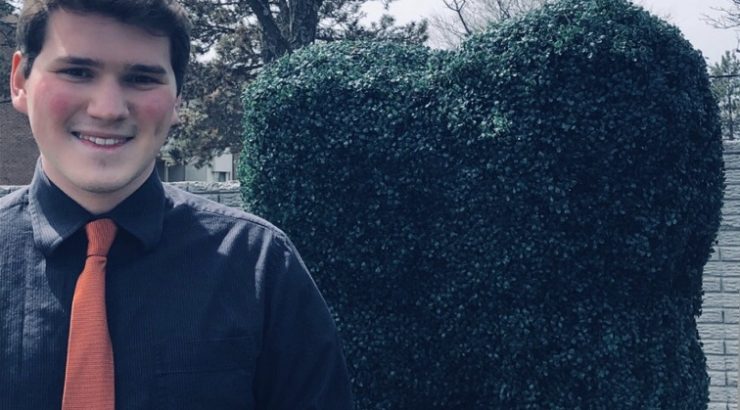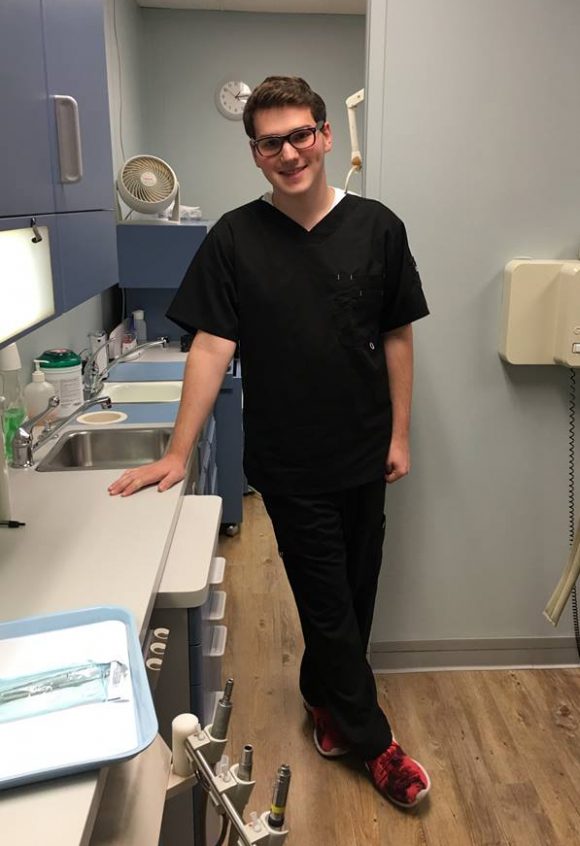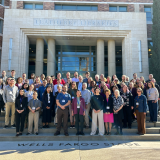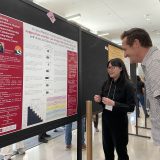
Feeling Counterproductive during Quarantine? Conduct COVID-19 Literature Research! Senior Josh Goldfaden shares his recent research findings
May 1, 2020

Josh Goldfaden shadowing his dentist, Dr. Skoglund, who inspired him to enter the dental field.
Josh Goldfaden is a senior biochemistry and molecular biology student. with a minor in integrated educational studies. Following graduation, he will be attending the University of Pacific’s Arthur A. Dugoni School of Dentistry in San Francisco to pursue his Doctorate in Dental Surgery.
On March 12th, 2020, I had just made a breakthrough with my capstone project research in developing an effective, non-fluorinated toothpaste inspired by Eastern medicine at Chapman’s School of Pharmacy (quite an appropriate study for a future dental student, I must add). However, as all Chapman classes had been moved online the day before, my faculty mentor encouraged me to go home amidst the uncertainty COVID-19’s future impact on our community. Currently, my home in Metro Detroit, Michigan is on the outskirts of one of the pandemic’s epicenters. Since being home, I have spent a majority of my time indoors (especially as we have been getting hit with snow in the past week), and I have also helped my temple deliver gloves to members in need for short-term use. Further, I am optimizing the knowledge I acquired from majoring in Biochemistry & Molecular Biology to look into potential, long-term drug treatments for the novel coronavirus.
After reading an article in Nature (1), I learned that the mechanism of action (MOA) of the coronavirus is as follows: this infectious agent binds to receptors on the surface of our cells called the angiotensin-converting enzyme 2 (ACE 2), which ultimately results in the notorious infection. Having taken Medicinal Chemistry last year (shout out to Dr. David Smith for being a wonderful and informative professor!), I immediately thought of ACE inhibitors, a class of drugs that bind to these receptors and are used to treat patients with hypertension and heart issues. This class of drugs has been in the crosshairs of COVID-19 research; yet, there is much ambiguity around these well-understood drugs. That is, these drugs may “competitively outcompete” the virus from binding to the ACE 2 receptor, so to say. However, ACE inhibitors also result in the upregulation of ACE 2 receptors, thus increasing the number of binding sights for the virus. According to the American College of Cardiology (2), “there are no experimental or clinical data demonstrating beneficial or adverse outcomes with background use of ACE inhibitors.”
As a countermeasure to the potential risks that ACE inhibitors pose, I hypothesize that these drugs could be modified in a way such that they are “rigged” with a defensive mechanism that will prevent the expression of ACE 2 receptors {potentially small interfering RNA (siRNA), which can block the synthesis of the receptor}. Further, siRNA could be used to block the synthesis of the virus. Specifically, when the coronavirus binds to the ACE 2 receptor, it transfects the cell with its own mRNA (instructions for creating more copies of the virus). siRNA could be delivered using a modified ACE inhibitor to obstruct the virus from being copied by our cells (this is theoretically achievable as the genome of the coronavirus causing this pandemic has been sequenced).
I wrote these ideas down and showed them to my mother, one of my most trusted confidants. She prompted me to submit these ideas to the Centers for Disease Control and Prevention (CDC). To my surprise, they responded me within a few weeks and informed me that my suggestion had been forwarded to the correct program. Per the CDC’s email, “there is no specific treatment (such as an FDA-approved antiviral drug) recommended for COVID-19 and no vaccine available to prevent infections in people.” So, the moral of this blog post is to submit any and all ideas that you, my fellow science students/science enthusiasts, may have!
Please pass this message along, and we may just bring an end to this sooner rather than later. Stay safe, everyone!
References
- South, A.M., Tomlinson, L., Edmonston, D. et al.Controversies of renin–angiotensin system inhibition during the COVID-19 pandemic. Nat Rev Nephrol (2020). https://doi.org/10.1038/s41581-020-0279-4
- American College of Cardiology. HFSA/ACC/AHA statement addresses concerns re: using RAAS antagonists in COVID-19. ACC News Story. 2020 Mar 17. (https://viajwat.ch/2REZU2H)

